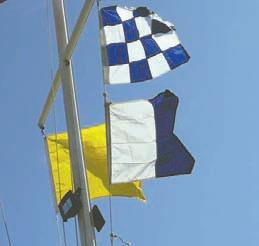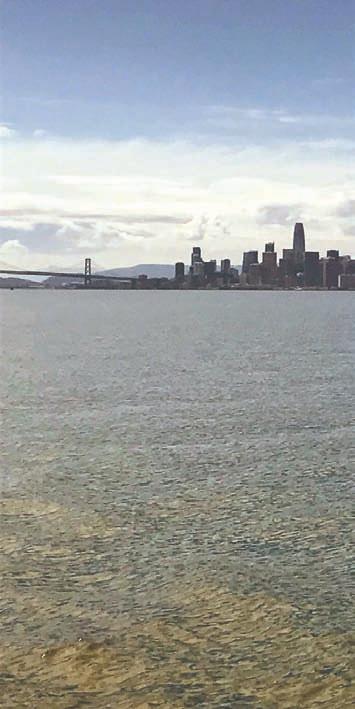
5 minute read
loose lips
weathering a global storm
There has been no aspect of humanity not touched by the coronavirus pandemic, not even the sailing world. It is nearly impossible to properly report the details, which seem to change daily and for the worse. Here's what we do know: Almost every Bay Area racing event has been canceled or postponed, from the Great Vallejo Race to SailGP's second season. Several countries have closed their borders, impacting numerous cruisers. Some people have written to us, asking if sailing is a responsible activity when the global call to action is to self-quarantine. When the crisis first took hold in early March, we sincerely thought that sailing was a responsible self-isolating activity. Just a week later, the epidemic accelerated, and the general thinking shifted. At the time of this writing, the consensus is that every nonessential movement outside our homes is ill-advised.
Advertisement
We are, however, not public health experts. Please consult your local government's guidelines regarding recreating responsibly. The real X factor in the sailing world is cruisers already traveling the world. We'll bring the latest on which countries are 'closed' in Quarantined in Paradise on page 84. Cruisers, who can easily selfisolate and are used to adapting to changing conditions, might be well positioned to deal with the crisis, and perhaps we all could take a page from their playbook. Please see The Cruiser's Mindset on page 70.
Despite the imperative to stay quarantined, we've been tickled to see that sailors are still connecting through virtual regattas, cocktail parties, and gatherings. Our vulnerability and global interdependence are more apparent than ever before. Therefore, while we must keep physical distance, now is a time for even more social intimacy. What's more, there are historical considerations. Kevin Ellis, an agent of Nuku Hiva Yacht Services, wrote the following message to a Pacific Puddle Jump email group: "We also need to be sensitive to the very serious emotional impact. In the Marquesas, the population was nearly wiped out at the turn of the 20th century due to illnesses brought here by the colonizers and missionaries. If you choose to move to another island, not only are you at risk of becoming a ping pong ball, you may well also be the source of additional anxiety."
On the Pacific Puddle Jump email list (an unofficial forum for southbound cruisers), the debate played out in a thread begun by Jeff Stander of the yacht Beatrix from Tasmania, Australia. He stated unequivocally: Just stay home. "I seriously think this is not the year to start cruising." After enumerating his reasons, Stander concluded, "The best strategy, especially for us older sailors, is to do our best to avoid contracting the virus until the first wave of infection passes, and medical care is more available. As a group, sailors are a more fit segment of their age cohort, and thus are more likely to survive than those with co-morbidities. Also, self-isolation on a boat is a lot easier." On that same thread, longtime Latitude reader and contributor Bruce Balan of the Cross trimaran Migration pointed out that "staying home," isn't necessarily an option for cruisers already out there. "It is wise to always consider the effect your cruising will make on a destination. For those already out cruising (and not leaving from their home port), you are having an effect on the country and port you are in. Economic hardships in island nations based on tourism, differing standards of medical care (e.g. French Polynesia compared to Tonga), population size, [and] risk of future infection should all play a role in one's decisions . . . as well as personal health considerations. "I do not agree that one can state categorically that no one should go cruising across the Pacific this year." Needless to say, many sailors are faced with difficult choices right now. The following excerpt comes from a New Zealand family's blog entry about whether to transit the Panama Canal, cross the Pacific, and return home this year. Max and Bianca, traveling aboard their Irwin 52 Spacegrazer with their three young children, wrote the
GREG VANDALEN
all races

abandoned
The fl ags tell the story of the month. The yellow fl ag is called "Quebec" but indicates "Quarantine." The checkerboard November fl ag means "Abandon." The Alpha swallowtail means "All." The two blue and white fl ags in combination signify "All races abandoned." A pundit at Richmond Yacht Club hoisted the fl ags on the club's fl agpole and sent us this photo.
The publisher of Latitude 38 also hoisted Q fl ags on his boat and at his house. He sent the staff home, where we've been "sheltering in place" ever since. We are all still working remotely, and can be reached by email or phone.
— chris
the global storm — continued
following: "We've been backward and forward and everywhere in between. Do we go, or do we stay? As all of the destinations between here and New Zealand closed down due to COVID-19, the feeling of control slipped away. The choices that were open to us last week are no longer on the table. It's very diffi cult to know if we are making the right decision." Deciding to stay on the Caribbean side of the Canal, they closed with the thought: "We humans have a great aptitude for adaptation. Surely, we will all be tested in the times ahead. Let's all take a deep breath . . . stay safe, stay positive, be kind." These are challenges faced across the Pacifi c and up and down the California coast. We also know sailors are resilient souls who've learned by sailing to look beyond the current tempest. In the long run, we see people returning to sailing with even more appreciation and gratitude for what it offers. There's nothing we look forward to more than reconnecting with sailing and the community around it. — latitude

"This is from Sunday [March 22] at noon," wrote Greg vanDalen. "Normally, there would be several races happening. Eerie." Normally, there would also be ferries, ships and tugboats, too. The world has come to a halt.








